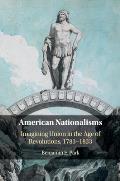Reading Too Much into the Declaration
Here’s something I’ve been thinking about since I heard the “Celebrating the Fourth” episode of the Ben Franklin’s World podcast from Liz Covart and the Omohundro Institute.
That episode came out a year ago, though it took at least a couple of months for me to catch up to it through my listening backlog. Fortunately, good podcasts don’t go out of date.
The conversation started with John Adams’s famously wrong prediction that Americans would celebrate independence on 2 July, when the Second Continental Congress voted to separate from Britain. As we all know, we celebrate on 4 July, when the Congress issued its Declaration of Independence.
One of Liz’s interviewees was Prof. Benjamin E. Park of Sam Houston State University, author of American Nationalisms: Imagining Union in an Age of Revolutions (2018). Ben said:
Imagine that the Continental Congress had issued a slightly different Declaration. Instead of starting, “In Congress, July 4, 1776, a Declaration…,“ the imaginary document started, “In Congress, per a resolve of July 2, 1776, a Declaration…”
Just like the Declaration we know, that text would have been printed, issued to newspapers, and sent out to all thirteen colonies and overseas. The newly independent states would have received that document at different times, just as they did historically. They would have announced the news on different dates. In New York City, for example, the official reading and unofficial statue-toppling was on 9 July. In Boston, both those rituals occurred on 18 July. But right up at the top of the document would come the big date from Philadelphia, “July 2, 1776.”
When 1777 rolled around, all thirteen states would celebrate one, united anniversary of independence. I don’t think officials and the public would consider the propriety of the date of the vote versus the date of the issuance of news. Even if they did prefer one or the other of those choices, they’d still have to rely on what information the Congress had sent out. The easiest course was simply to choose the big date at the top of the national document.
In this hypothetical scenario, John Adams’s prediction would have been absolutely right. As it was, he celebrated with other Americans on 4 July 1777 and showed no resentment, or even memory, of having predicted otherwise.
That episode came out a year ago, though it took at least a couple of months for me to catch up to it through my listening backlog. Fortunately, good podcasts don’t go out of date.
The conversation started with John Adams’s famously wrong prediction that Americans would celebrate independence on 2 July, when the Second Continental Congress voted to separate from Britain. As we all know, we celebrate on 4 July, when the Congress issued its Declaration of Independence.
One of Liz’s interviewees was Prof. Benjamin E. Park of Sam Houston State University, author of American Nationalisms: Imagining Union in an Age of Revolutions (2018). Ben said:
When they ratified the written document,…that’s the moment we celebrate. And I think it’s important to take a moment and note why. I think there’s something in the written document. I think there’s something that’s tangible, there’s something that’s written. We’re a nation that celebrates…our founding ideals as captured in the written word. So I think it’s important the we celebrate for our Independence Day the day we have the document, not just the political vote or the political words.I agree that the written tangibility of the Declaration is crucial in how the nation quickly came to celebrate Independence Day. I’m not convinced, however, that the choice of the Fourth shows a cultural preference for the written declaration over the political vote. And here’s a little thought experiment to explain why.
Imagine that the Continental Congress had issued a slightly different Declaration. Instead of starting, “In Congress, July 4, 1776, a Declaration…,“ the imaginary document started, “In Congress, per a resolve of July 2, 1776, a Declaration…”
Just like the Declaration we know, that text would have been printed, issued to newspapers, and sent out to all thirteen colonies and overseas. The newly independent states would have received that document at different times, just as they did historically. They would have announced the news on different dates. In New York City, for example, the official reading and unofficial statue-toppling was on 9 July. In Boston, both those rituals occurred on 18 July. But right up at the top of the document would come the big date from Philadelphia, “July 2, 1776.”
When 1777 rolled around, all thirteen states would celebrate one, united anniversary of independence. I don’t think officials and the public would consider the propriety of the date of the vote versus the date of the issuance of news. Even if they did prefer one or the other of those choices, they’d still have to rely on what information the Congress had sent out. The easiest course was simply to choose the big date at the top of the national document.
In this hypothetical scenario, John Adams’s prediction would have been absolutely right. As it was, he celebrated with other Americans on 4 July 1777 and showed no resentment, or even memory, of having predicted otherwise.


1 comment:
I appreciate your take on why we celebrate July 4. Without saying where I work, as a part of regular job, I often interpret the historical events surrounding The Fourth. I've often brought up the whole Adams July 2nd prediction and the fact that we celebrate on the wrong day. The way I explain it/my hypothesis: On the 2nd, 13 British colonies pass a resolution calling for independence from Great Britain, two days later, after much editing, they sent out the press release. The date on the press release is July 4. That's the date everybody saw, the rest is history.
Post a Comment